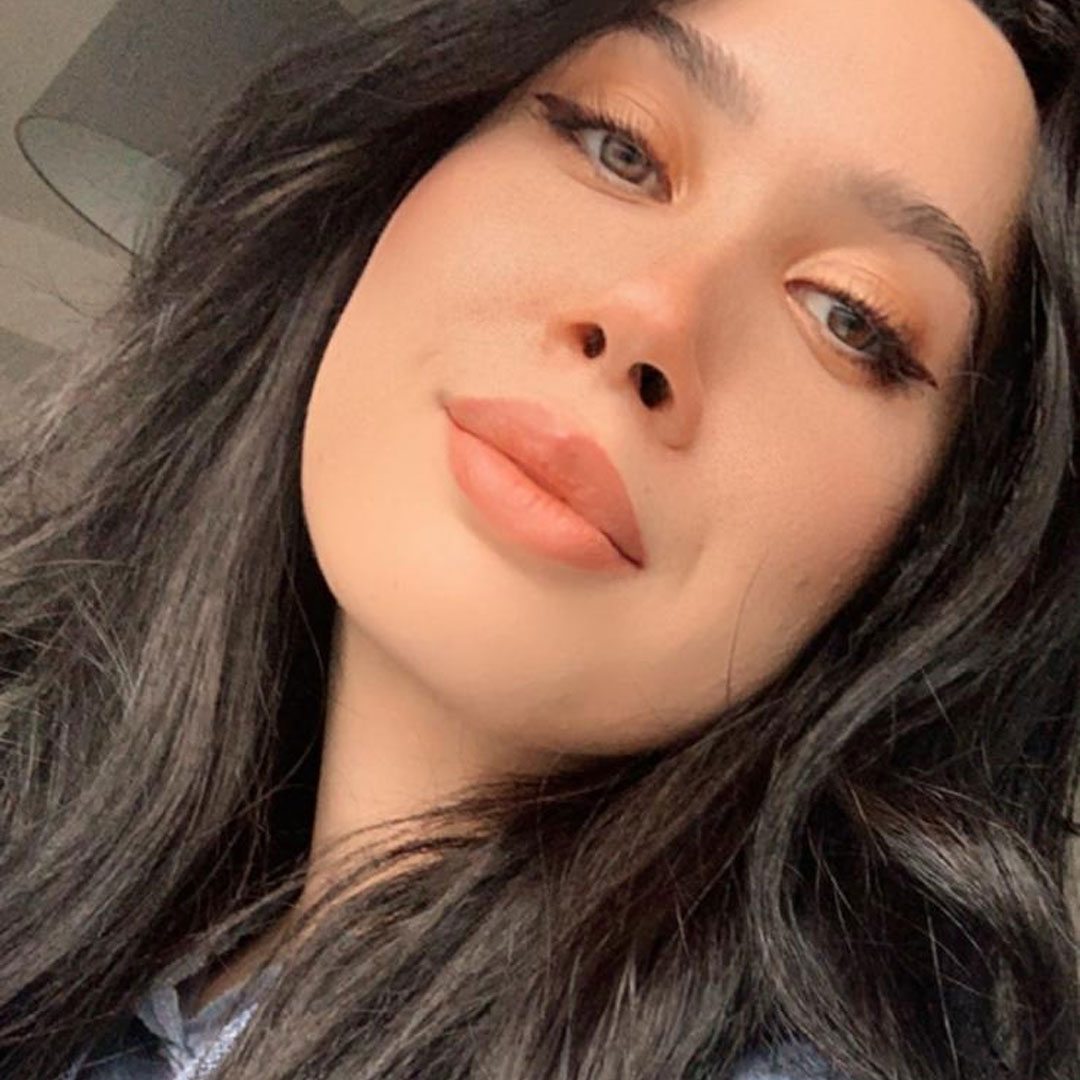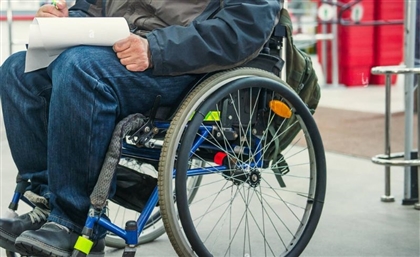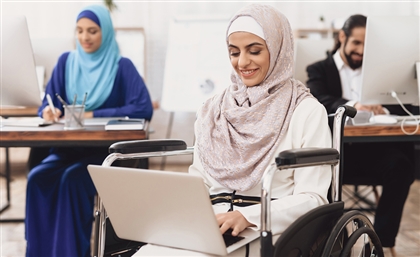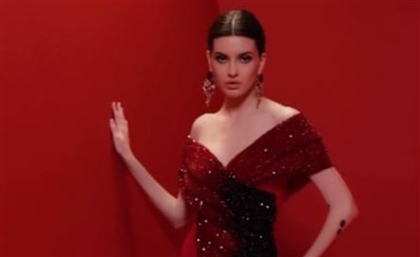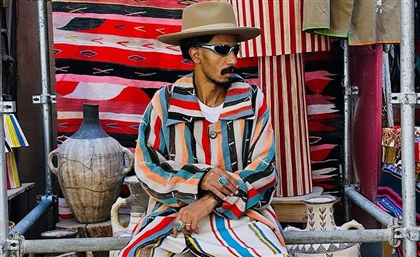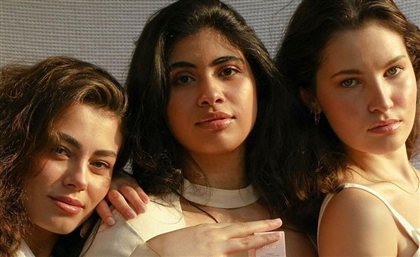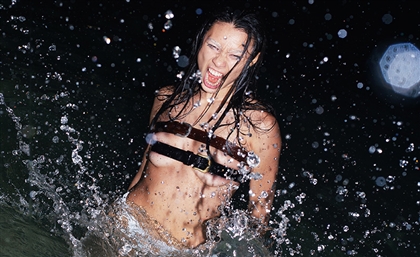How 'A Different Story By N' Puts the Spotlight on Inclusive Learning
Staff writer Farida El Shafie sat down with founder Nazli El Leithy to discuss how her platform, 'A Different Story by N', helps nudge the conversation around disabilities forward one step at a time.
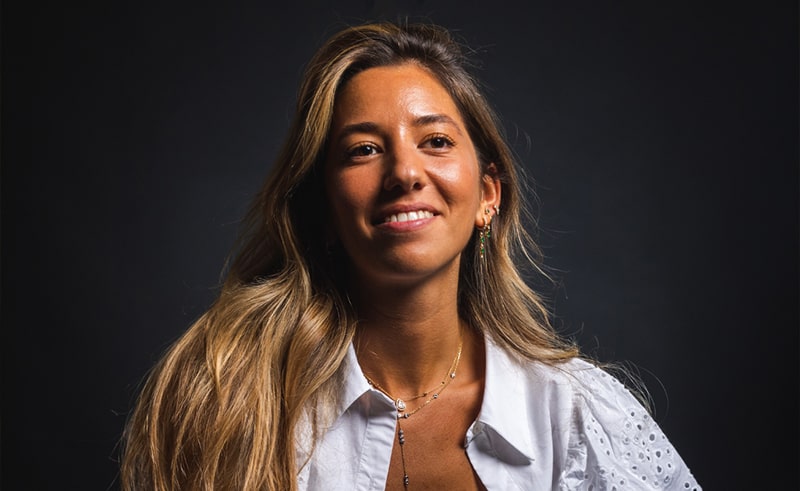
To recall a time when we were not riddled with anxiety over our academics or our mental health is to recall a time before our natality. Perturbed and brimming with anxiety, I moseyed my way into my eighth-grade science class; where I once more had to internally question whether squinting is a middle schooler’s rite of passage or if I have to approach my parents regarding my blurry vision. Eventually, I sat in the front row. Being tall, I was bombarded with comments along the lines of ‘enty ata’ty a’laya maya w noor’, and naturally, I succumbed to the criticism, putting my education on the back burner, and chose to sit at the back. Slyly peaking glances at my deskmate’s notes kept me going until the day finally came, and my privileged position allowed me to get my first pair of glasses.
Disabilities, visible or invisible, socially accepted or not, medicated or physically assisted or otherwise, have had their fair share of misconceptions. The truth is, there is barely any conversation around neurodivergence. The closest we get, at least within our education system, is, “Boy is hyperactive, therefore boy has ADHD.” This precise level of sweeping commentary enables few to be noticed and many to be ostracised. It does not allow for the nuances to be acknowledged and for the struggles to be highlighted.
A Different Story by N is a platform established by Nazli El Leithy to equip people, particularly children with learning difficulties, to handle the common pitfalls they face in their school life.
What inspired A Different Story by N?
“This all dates back to when I was in school. I was raised around people with special needs and ones that need special care, and it’s something that always intrigued me. I mostly thought about how the way they live and experience the world is very special. I grew up in Paris, and my siblings and I were enrolled in a very inclusive school at a time when inclusive just meant an integrative community, but not a place where you have children with autism or Down syndrome. So, that school was very much that exposure for me.”
What does ‘A Different Story’ aim to do?
“We aim to give these children tools that will help them cope in an academic environment, such as their working memory, processing speed, attention span, and cognitive ability. These are the building blocks upon which they can grow to cope and thrive in school. I feel that there's no denying that, as a global community, we have trouble accepting specific kinds of differences. We also have those major misconceptions and judgments about individuals with special needs and disabilities, and I just wanted to do my part to try and change that on a small scale.”
How did you land on social media as the main medium to advocate for inclusive learning?
“During the lockdown, we were all glued to our homes. By default, there were a lot of live videos and a growing emphasis on social media. This is when I got the idea to maybe have people come and sit down and talk about their experiences. A chance for people involved in the field to come forward and share their stories. Whether that's an autistic child or an adult with a disability, a teacher or an academic, I wanted to give these people a space.
I believe that storytelling helps us highlight all of the things that happen in our field, and can, therefore, have an incredible impact on how academics and counsellors change public attitudes. When people listen to live videos, they can connect on a very personal level. When you hear someone talking from their own experience or you find a working professional talking about what they do on their job, it’s incredibly relatable and its impact is unmatched.
That’s when the platform morphed into a podcast, which then became an awareness movement. I produced it as a podcast because it was more accessible to both myself and my intended audience.”
Putting your own expertise at the forefront of this next question - outside of academic confines- how would you define disability?
“Disability is just a different way of experiencing the world. It's a different way of learning, socialising, interpreting information, and expressing opinions.I follow this school of thought, and others might not necessarily agree. I feel like people are strengthening weaknesses across the board, whether it’s a disability or not, we all have strengths and weaknesses, in all different domains of life.”
With much ongoing deliberation in regards to what constitutes discriminatory acts, what does discrimination entail for you, even on a microscopic level?
“As a society, we’ve linked the term disability to such stigmatising associations, either consciously or unconsciously. Therefore, whenever we hear the term ‘disabled’, we think it's a bad word or we immediately put that person in a box and place a lid on their capabilities. We forget that we give words their power. We can transform the term ‘disability’ and its connotations because, politically and legally, all over the world, ‘stability’ is the correct term to use, and it doesn't mean anything. It puts your personhood before your disability. People have asthma and need inhalers, or they have poor eyesight and need glasses, this is how all disabilities should be reframed.
On the social everyday level, people with disabilities are treated differently. They find it harder to make friends because children with autism, for example, can't read social cues. They might take things very pragmatically, so they rub people the wrong way. I see that every day with some children that are different. They're targets of people just because they don't fit in. What is very commonly known or very commonly familiar to everyone? Anything that diverges from the norm suddenly means that there must be something wrong with you. Nobody will think you’re quirky or interesting or just, different. People are not comfortable with what they don't know, and they’re especially uncomfortable with different kinds of behaviour and self-expression.”
How do you believe we can deconstruct the label and overcome the stigmatising associations?
“Being able to help someone that has a disability is about making room for them so they can grow, receive opportunities, work, and learn. I think that we all learn and function in unique ways. We need to see beyond the label that we attach to the individual. I think it’s us, as a society, that disabled these individuals because we placed obstacles in their way, those obstacles primarily being our mindsets and our refusal to accommodate their needs. Since we've created this stigma, we can also deconstruct it. We can do so by allowing them to thrive by giving them opportunities and allowing them to fully immerse themselves in society. We also need to give them access to education and healthcare, just like everyone else.”
As someone who’s an expert in her chosen field, what would advise employers to do in order to make room for people with learning difficulties?
“Well, the very first thing that I would encourage employers to do is to talk directly with the person that has a specific disability because they know themselves best. They're very well-attuned and well-aware of their strengths and needs. For example, someone with ADHD requires a different approach that allows them to focus on specific tasks in limited amounts of time. So, a manager or CEO can't expect someone with ADHD to sit and produce output for seven consecutive hours even with breaks because that is very difficult for them to do, given the way their brain circuitry is wired.”
What role do you see mental health playing when it comes to inclusive learning?
“My area isn't mental health, but I can touch on how it links to special needs because it is a common link. For autism, for example, there’s a comorbid association with depression and anxiety. This usually stems from their social anxiety, they tend to feel like they're playing catch-up or that people are judging them and aren't including them in daily activities. It can be excruciating to sit with those feelings, which is often very depressing. We're also dealing with someone who needs to build their self-esteem, and you're trying to work on showing them that it's completely normal to make a mistake. It's fine to say, ‘I don't know.’ Families go through a lot of stress to find services for their children, and they're constantly worried about them. This is also a difficult process for families, and we need to remember that.”
There’s privilege in being able to get a diagnosis, what are your own thoughts on the whole diagnosis process and the accessibility factor that comes with it?
“It’s a very fine line between just getting a diagnosis and then placing too much importance on it. It’s a double-edged sword, because you want the diagnosis since it gives you comfort and understanding as to why you behave or experience in a certain way, and that’s comforting. However, it also means being stuck with a label that allows people to perceive you as difficult, and having them project their frustration on dealing with the label they’re perceiving and what comes with it.”
Inspired by the stories she’s heard through her platform, A Story by N, Nazli El Leithy partnered up with her co-founder, Malak El-Batran, to launch an offshoot passion project. Kollena, an online directory of accessible resources on disability and inclusive and special needs learning, is only a natural development of both founders’ obvious enthusiasm for understanding disability and education. They’re paving the way for more inclusionary learning in Egypt by consistently placing emphasis on destigmatizing disability in all facets of life.
- Previous Article Dr.Sisilove or How (Not) To Diffuse A Bomb
- Next Article Studio M6 Reimagine Red Brick Facades in This Greek Residence Render



